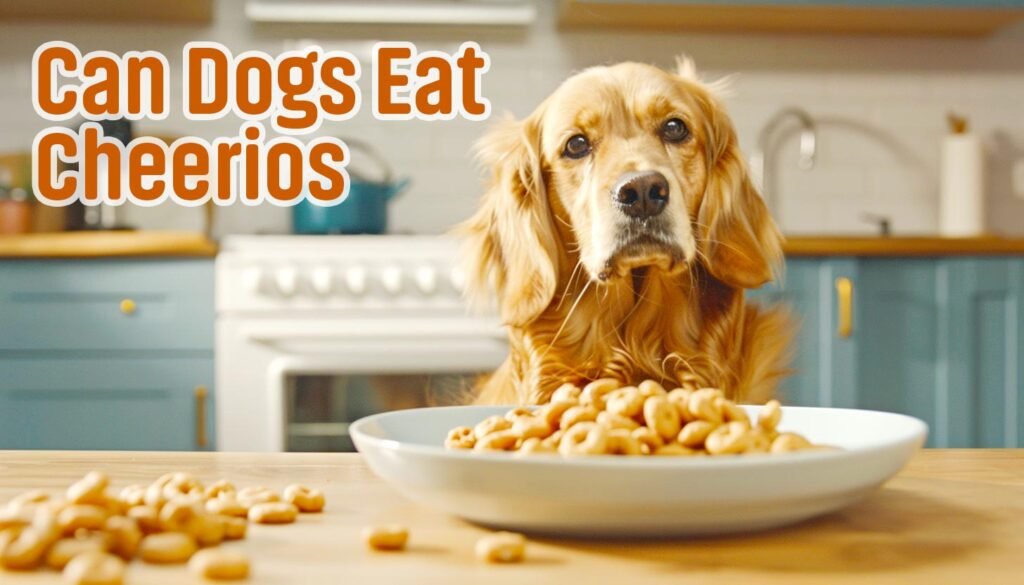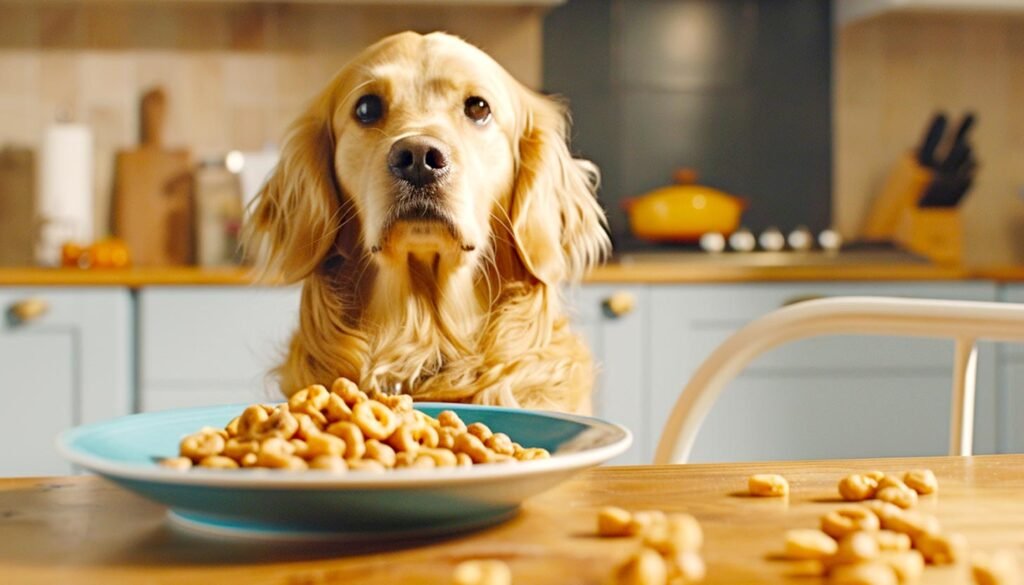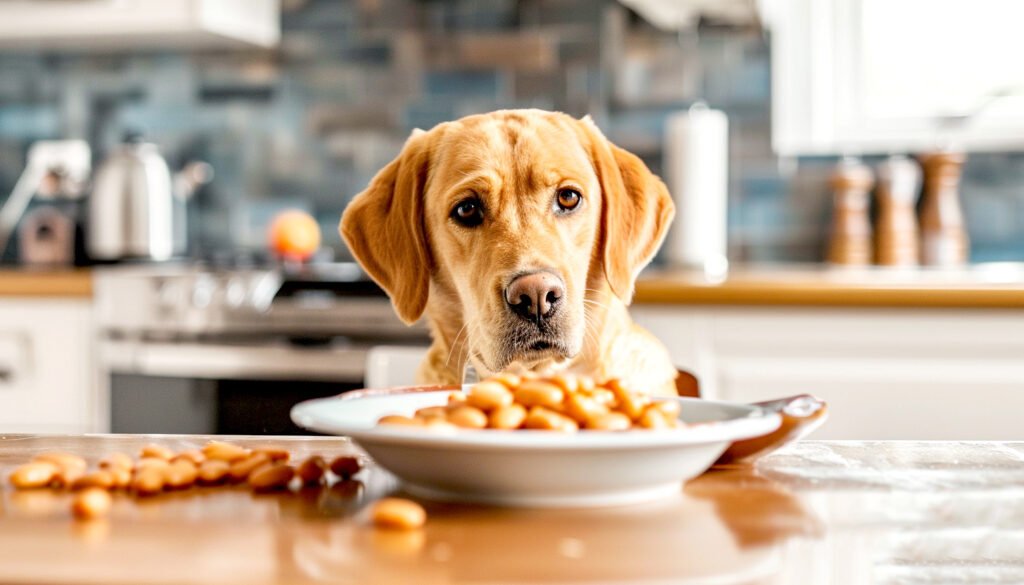Many dog owners often wonder whether it’s safe to share their favorite snacks with their furry companions. After all, dogs have a knack for giving us those irresistible puppy-dog eyes whenever we’re indulging in a tasty treat. Cheerios, those iconic little O’s that have found a permanent place in many households’ breakfast routines, are no exception to this curiosity. But as caring pet parents, it’s natural to question whether these crunchy delights are suitable for our four-legged friends.
In this guide, we’re diving deep into the world of Cheerios and their suitability for our canine companions. We’ll explore the nutritional content of Cheerios, any potential benefits they might offer for dogs, and most importantly, whether they’re safe to share. So grab yourself a bowl of Cheerios and join us as we embark on this quest to uncover whether our furry friends can enjoy them too.
Contents
- 1 Nutritional Content of Cheerios
- 2 Can Dogs Eat Cheerios?
- 3 Potential Benefits of Cheerios for Dogs
- 4 Moderation and Portion Control
- 5 Cheerios Can Be an Ideal Snack Option for Dogs
- 6 Can My Dog Have Bran Flakes?
- 7 Exploring Dogs and Cheese
- 8 In Conclusion: Can Dogs Eat Cheerios?
- 9 FAQs On Cheerios for Dogs
Nutritional Content of Cheerios
Cheerios Are Packed with Nutritious Benefits Cheerios offer more than just delicious breakfast treats: they also contain essential nutrients that can nourish both humans and our canine companions alike. Cheerios are made primarily of whole grain oats that provide complex carbs, fiber, vitamins, and minerals – not to mention a great taste experience!
Nutritional Value Of Cheerios:
| Amount Per 28 grams | % Daily Value* | |
| Calories | 105.3 | |
| Total Fat | 1.9 g | – |
| Saturated fat | 0.4 g | – |
| Sodium | 139.2 mg | 6% |
| Potassium | 179.5 mg | 4% |
| Total Carbohydrate | 20.5 g | – |
| Protein | 3.4 g |
Whole grain oats are an incredibly nutritious food source, offering multiple health advantages. Packed with fiber to aid digestion and regulate blood sugar levels, as well as beta-glucan fiber that has been linked to improved heart health by lowering cholesterol levels, they boast numerous nutritional advantages that are hard to beat.
Cheerios cereals are often fortified with various vitamins and minerals to enhance their nutritional profile, such as iron, calcium, B vitamins like niacin, riboflavin, and folate, among others. These added nutrients can provide significant support to overall health and well-being ranging from energy metabolism to bone health.
Cheerios’ cereal stands out for its low sugar content. Compared to many other cereals on the market, Cheerios generally contain few added sugars – making it an attractive option for individuals trying to decrease their sugar intake or those living with diabetes who need to watch their consumption of added sugars. This makes Cheerios an especially smart choice.
Cheerios come in all sorts of flavors and varieties; it is important to be aware that not all are equally nutritious. Flavored varieties may contain high levels of added sugars and artificial ingredients that detract from their nutritional value. When selecting Cheerios for yourself or your pup, choose plain unsweetened varieties when possible in order to maximize health benefits.
Cheerios offer a potentially nutritious snack option for both humans and dogs alike, yet before offering Cheerios to your furry friend it is crucial that any potential risks are evaluated and your veterinarian consulted in order to ensure it fits within his/her individual dietary needs.

Can Dogs Eat Cheerios?
Yes, dogs can occasionally eat Cheerios in moderation. However, it is important to make sure that it does not contain any added sugar or artificial sweeteners. Cheerios with added sugar or artificial sweeteners may be harmful to dogs. Always check with your veterinarian before introducing new foods to your dog’s diet.
Cheerios are a beloved breakfast choice for humans, so many pet parents may wonder whether the same foods are safe for their furry companions. While yes, Cheerios are safe for consumption by dogs, there are certain considerations you need to take into account before feeding any to your furry pal.
Before feeding Cheerios to your dog, you must read and review its ingredients list carefully. Unsweetened varieties tend to be safe as they contain minimal added sugars and are made primarily of whole-grain oats. However, flavored varieties could contain additional ingredients such as artificial flavors or sweeteners which could potentially harm them.
Another key consideration for Cheerios-fed canines is portion size. Though low in calories and providing a nutritious snack option for dogs, too much consumption could lead to excess caloric intake that could lead to weight gain or other health concerns over time. As a general guideline, treats should make up no more than 10% of daily calorie consumption for your pup.
Additionally, certain dogs may be sensitive or allergic to certain ingredients found in Cheerios. If your pup exhibits signs of digestive upset after feeding them Cheerios – such as vomiting, diarrhea, or excessive gas production – it would be prudent to discontinue feeding them altogether and consult your veterinarian immediately.
Cheerios should only be offered as a treat and should never replace balanced meals or essential components of your dog’s diet. While Cheerios may provide some nutritional advantages, they shouldn’t replace balanced meals or other necessary components of their daily meal plans.
Potential Benefits of Cheerios for Dogs
Cheerios Can Benefit Our Canine Companions Cheerios may offer benefits to our canine companions too! Here are a few ways that Cheerios could be useful:
1. High in Fiber: Cheerios are made of whole-grain oats, which contain ample dietary fiber. Fiber plays an essential role in supporting canine digestive health by encouraging regular bowel movements and warding off constipation, making Cheerios an excellent addition to their diet in moderation. Incorporating them as part of your pet’s meal could support their gut health in ways you may never expect!
2. Low in Calories: Cheerios dog treats are relatively low in calories, making them an excellent option for weight control or maintaining a healthy body weight. Adding Cheerios as occasional training treats or snacks between meals may help avoid overfeeding and excess calorie consumption.
3. Crunchy Texture: Cheerios’ crunchy texture provides dogs with a satisfying chewing experience, helping promote dental health by reducing plaque and tartar accumulation on your pet’s teeth. Although chewing Cheerios should not replace regular dental care like brushing, they can provide additional assistance in this regard.
4. Simplicity of Ingredients: Plain Cheerios have a relatively short ingredient list consisting primarily of whole-grain oats. Their simplicity makes them an excellent option for dogs with food sensitivities or allergies; however, it’s essential that the list be thoroughly examined to make sure there are no additives or flavorings that could potentially harm them.
5. Packed With Vitamins and Minerals: Cheerios contain essential vitamins and minerals for your pup’s overall health and well-being, such as iron, calcium, and various B vitamins. These added nutrients may support energy metabolism as well as bone health in their diet.

Moderation and Portion Control
Just like with any treat or snack, moderation, and portion control are of utmost importance when feeding Cheerios to your dog. While Cheerios offer tasty rewards that could potentially improve his or her health, overdoing it may pose health issues in the future if consumed too frequently. Here’s why this step should not be missed:
1. Calorie Intake: Cheerios may be lower calorie treats compared to many others, but they still contribute to your dog’s total caloric intake. Feeding too many Cheerios alongside regular meals and other treats may quickly add up and lead to excessive calorie consumption resulting in weight gain or obesity, and potentially increasing risk for various health problems including diabetes, joint problems, or cardiovascular diseases.
2. Nutritional Balance: Although Cheerios provide some nutrition benefits for your pup, they shouldn’t replace balanced meals or other key components of his/her diet. Dogs require various forms of nutrients for good health and wellbeing – protein, fats, vitamins, and minerals are all vital parts of their wellbeing and too many Cheerios could potentially lead to imbalanced diets if too many nutrient-rich foods like steak are displaced from its intake.
3. Digestive Upset: Rapid or excessive introduction of new foods or treats into your dog’s diet may lead to digestive upset, with symptoms including vomiting, diarrhea, or stomach discomfort in some dogs. Gradual introduction can reduce this risk. By feeding Cheerios gradually into their daily regimen you can help decrease any chances of digestive issues in your pup.
To achieve balance when feeding Cheerios to your dog, keep these guidelines in mind:
Limit Treats: Your dog’s daily calorie needs should be calculated using factors like age, activity level, and weight goals; accordingly adjust their treat ration accordingly. Cheerios should comprise no more than 10% of daily caloric intake for optimal health and should only represent up to 10% of that intake as treats.
Using Cheerios as Training Rewards: Cheerios make an easy, delicious treat that you can use as training rewards, either during training sessions or throughout the day. Break them into smaller pieces to increase their longevity and extend the calorie content.
Monitor Your Dog’s Weight: To ensure they maintain an ideal body condition and weight, keep an eye on their weight and body condition regularly. If any significant changes arise in either, adjust their food accordingly.
By practicing moderation and portion control, Cheerios can be enjoyed as a tasty treat without endangering their health and well-being. Should any concerns arise when feeding Cheerios to your dog or need guidance regarding portion sizes, contact your veterinarian for guidance and personalized advice.
Cheerios Can Be an Ideal Snack Option for Dogs
Cheerios may make for a safe and convenient snack option for dogs, but there are other safe cereal choices worth exploring that offer variety in texture, flavor, and nutrition benefits for their pups. Here are a few such safe cereal choices:
Plain Oatmeal: Oatmeal is an ideal and nutritional cereal choice for dogs, boasting high fiber, low calories, and easy digestion – ideal for sensitive stomachs! Furthermore, oatmeal can be prepared in a variety of ways including cooked and served plain as well as mixed in with other dog-friendly ingredients like fruits or vegetables for variety and added variety.
Brown Rice Cereal: Brown rice cereal offers complex carbohydrates and essential nutrients that will support their digestive systems while helping regulate bowel movements. Cook and serve it on its own or mix it with lean proteins for enhanced flavor and nutritional benefits.
Unsweetened Rice Puffs: Rice puffs are light, airy treats that are perfect for dogs to snack on. They typically consist of brown rice with minimal added sugars or flavors for maximum nutritional benefit – perfect as standalone treats or mixed into other dog-friendly ingredients for variety!
Whole Grain Cereals: Whole grain cereals such as whole wheat or barley flakes may also be suitable for dogs in moderation, offering fiber, vitamins, and minerals essential for their overall health and well-being. When selecting cereal for your pup’s diet, look for plain varieties without added sugars or artificial ingredients – these will do best.
Homemade Cereal Mixes: If you want a tailored cereal option for your dog, why not create homemade cereal mixes on your own? Simply mix plain oats, brown rice, and any dog-safe ingredients such as carrots, green beans or lean proteins into delicious homemade cereal mixes that meet their dietary requirements perfectly! Plus you have complete control of their contents; tailoring everything exactly according to their preferences or specific dietary needs!
Can My Dog Have Bran Flakes?
Bran flakes, such as Cheerios, are a delicious breakfast cereal option that many dog owners may consider giving to their furry pal. Before introducing bran flakes into the equation for your pup’s diet, however, it’s essential that you understand all potential advantages and drawbacks associated with giving this choice.
Bran flakes are made from wheat bran, the outermost layer of the kernel of wheat. As such, they contain high levels of dietary fiber which is beneficial for dogs in moderation as fiber plays a crucial role in maintaining digestive health, encouraging regular bowel movements, and avoiding constipation. By including bran flakes into their diet regularly they will support their gastrointestinal function and overall gut health.
Additional nutritional advantages exist with feeding bran flakes to dogs. They contain essential vitamins and minerals such as iron, magnesium, and B vitamins, all of which contribute to overall health and wellbeing in your pup. It should be noted that bran flakes contain significant quantities of carbohydrates and calories so should only be fed moderately so as to prevent overfeeding or excessive caloric consumption.
Bran flakes may provide your dog with essential nutrition, but there may also be potential risks to consider. Some bran flakes contain added sugars, artificial flavorings, or ingredients that could harm them. Additionally, some animals have sensitivities to wheat or grains which could result in digestive upset or other adverse reactions.
Before providing bran flakes to your dog, it’s essential that you review their ingredients list and opt for plain, unsweetened varieties whenever possible. Introduce small amounts gradually over time until you observe signs of digestive upset such as vomiting, diarrhea, or stomach discomfort; in such an instance, stop feeding bran flakes immediately and consult your veterinarian immediately.

Exploring Dogs and Cheese
Cheese is an irresistibly delectable treat for many humans and should be included as part of a varied diet. But some dog owners might be curious as to whether cheese could also make for an appetizing and protein-rich treat for their pups – while it might taste great, there are several factors you must take into consideration before feeding your pet this tasty dairy treat.
Cheese provides your dog with essential protein, calcium, and other essential nutrients – making it an energizing addition to his or her diet. Protein helps with muscle development and repair while calcium promotes bone health and density. Furthermore, cheese often has high fat contents which provides concentrated energy sources for active dogs.
Cheese may provide nutritional benefits to some dogs; however, not all canines will find cheese suitable. Some dogs are lactose intolerant – meaning they lack an enzyme necessary to digest lactose (found in milk and dairy products). Feeding such dogs cheese may result in digestive upset such as gas, bloat, diarrhea, or stomach discomfort.
Cheese contains many calories and fat, which may lead to weight gain if fed excessively. Cheese treats may provide your pup with delicious delight, but be mindful to monitor portion sizes and caloric intake to avoid health complications related to weight.
When feeding cheese to your dog, it’s best to choose low-lactose or lactose-free varieties like cottage cheese or hard cheeses such as cheddar or Swiss. These contain lower levels of lactose which may help soothe lactose-intolerant dogs more readily. Furthermore, select cheese options with minimal sodium levels and free from extra seasonings or flavorings that could potentially harm their health.
As with any new food or treat, it is essential that cheese be slowly introduced into your dog’s diet and closely monitored. Start off slowly by giving small amounts and observe for any signs of digestive upset or allergic reactions. If they tolerate it well and enjoy eating it as treats then incorporate occasional cheese treats as special rewards or training incentives into their regular food schedule.
Cheese can be an enjoyable and nutritious treat for dogs, but it must be fed responsibly and in moderation to meet individual requirements. By selecting high-quality options and closely monitoring their reaction, you can safely indulge their cheese cravings while maintaining health and well-being. If any concerns arise with regard to feeding cheese to your pup, always seek advice from a veterinarian for assistance and guidance.
In Conclusion: Can Dogs Eat Cheerios?
Knowledge is power when it comes to making informed choices for the diet of our furry companions. In this guide, we have explored whether dogs can eat Cheerios cereal as treats; considered other safe cereal options and discussed cheese as possible treats; and examined whether cheese could make for suitable treats. Now let us sum up what we’ve learned so far and discuss ways that you can make educated decisions for their diet.
1. Understand Cheerios: Cheerios can provide a safe and nutritious treat for dogs when fed in moderation, thanks to their high fiber content and straightforward ingredient list. Their popularity with owners looking for crunchy yet nutritious treats makes Cheerios an attractive option; just be sure to read and follow all label guidelines, selecting plain unsweetened varieties to reduce digestive upset or other adverse reactions.
2. Explore Alternative Cereal Options: In addition to Cheerios, other safe cereal options exist for dogs to enjoy besides Cheerios. From oatmeal and brown rice cereal to unsweetened rice puffs and homemade cereal mixes – there is an array of choices out there that offer variety in texture and flavor to keep your pup’s tastebuds satisfied while providing essential nutrients essential to overall health.
3. Assess Cheese as a Treat: While cheese can provide dogs with delicious protein-rich treats, it must be approached carefully to prevent lactose intolerant or sensitive individuals from becoming upset by it. Likewise, cheese contains high amounts of calories and fat so consumption should be done sparingly to prevent weight gain or health complications in the future. For optimal results choose lactose-free cheese varieties for monitoring their response to it closely.
As is true for humans, feeding your pet should always come first when it comes to its health and well-being. By making informed choices based on his/her individual dietary needs and sensitivities, you can ensure they receive all of the nutrition they require for healthy development.
If you have any further inquiries or concerns about feeding Cheerios to your dog or any aspect of their diet, don’t hesitate to consult your veterinarian. They are well-equipped to offer expert guidance tailored specifically to their individual needs, helping ensure the best decisions can be made for their well-being and overall health.
FAQs On Cheerios for Dogs
Q: Can dogs eat Cheerios daily?
It’s best to offer Cheerios in moderation to avoid overfeeding and potential nutritional imbalances in your dog’s diet.
Q: Are there Cheerios alternatives for dogs?
Yes, there are dog-specific cereals and treats available, but always consult your vet before introducing new foods.
Q: Can dogs have flavored Cheerios?
It’s safer to stick to plain, unsweetened Cheerios to prevent digestive issues in dogs.
Q: How do I know if my dog is allergic to Cheerios?
Look out for signs like itching, vomiting, or diarrhea. If observed, stop feeding Cheerios and consult your vet.
Q: How should I incorporate Cheerios into my dog’s diet?
Offer Cheerios in moderation as occasional treats or during training sessions, and monitor your dog’s reaction closely.
You can also read this post: Can Dogs Eat Butternut Squash?



